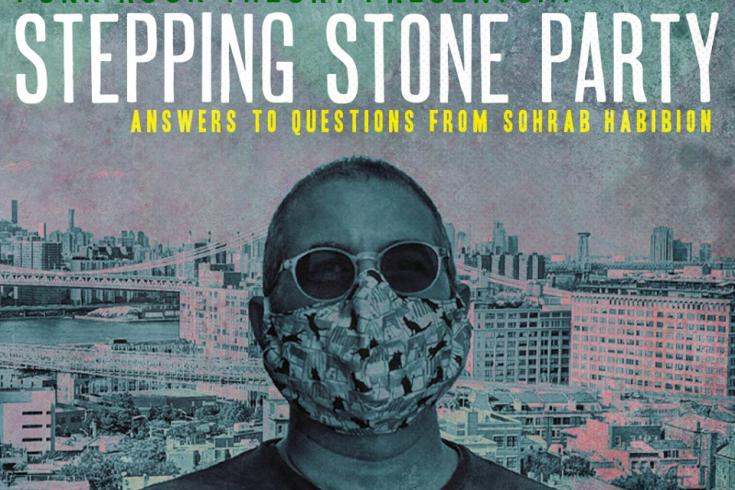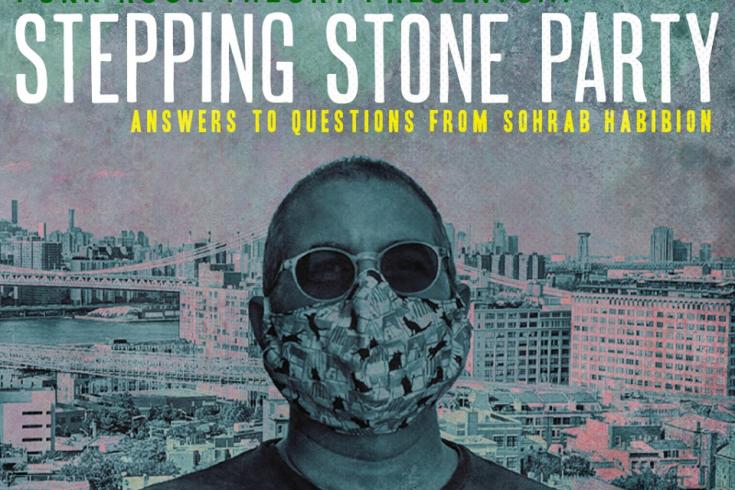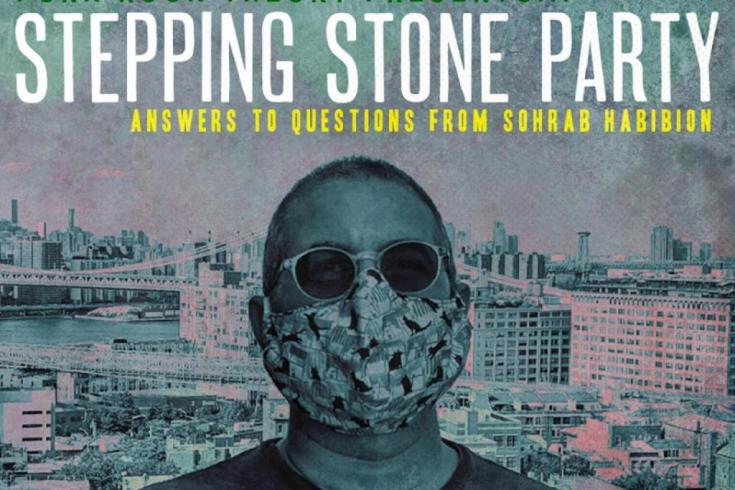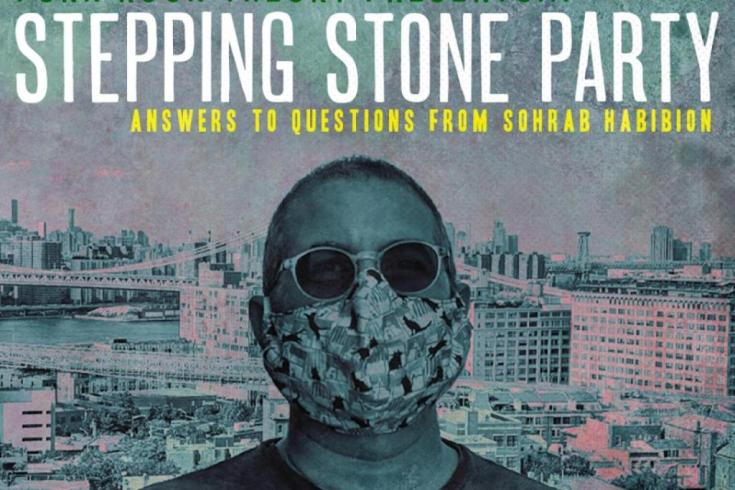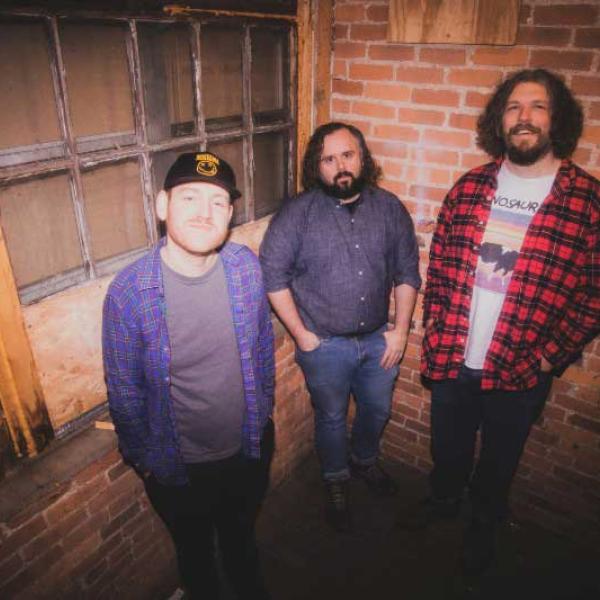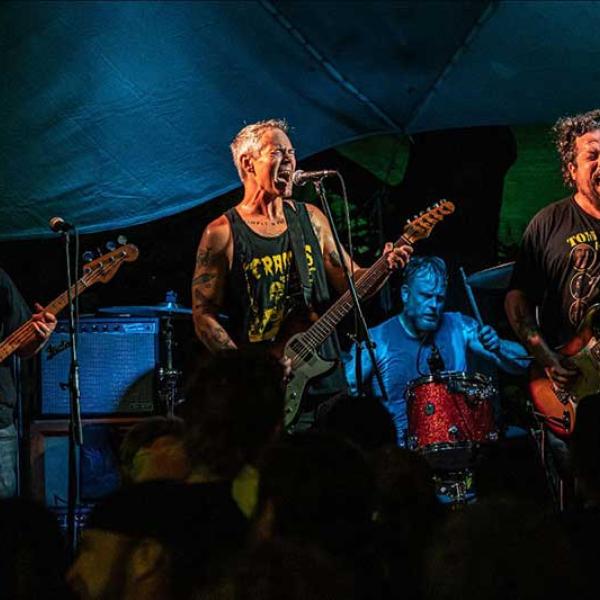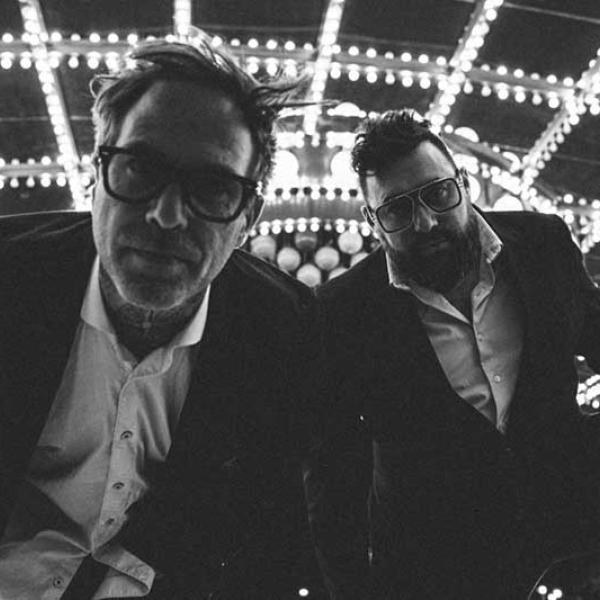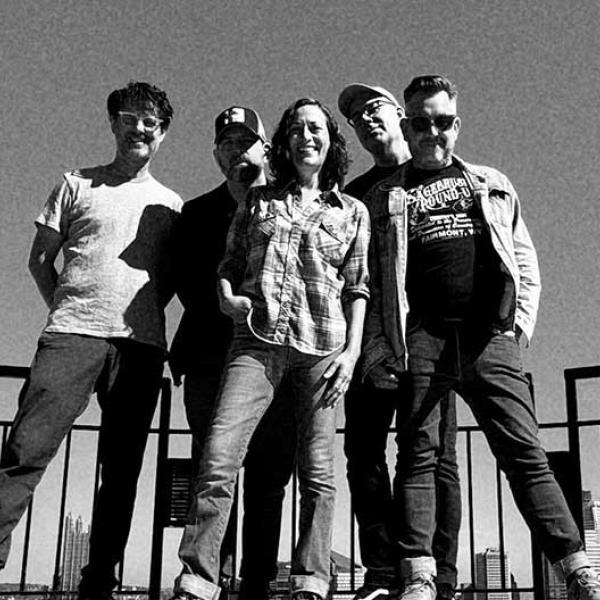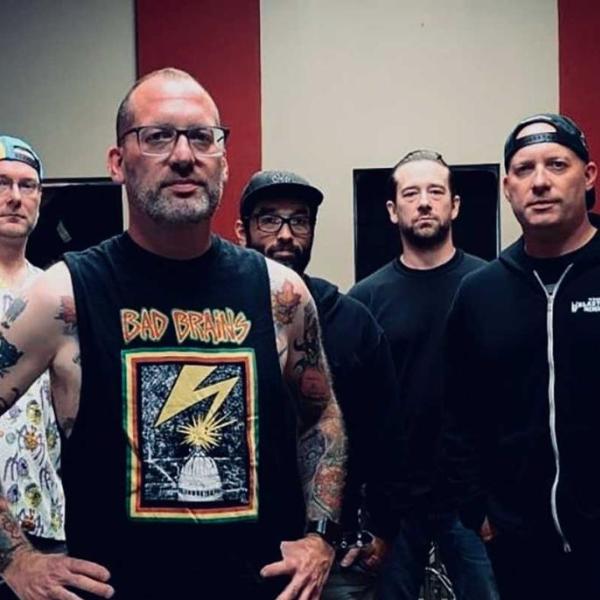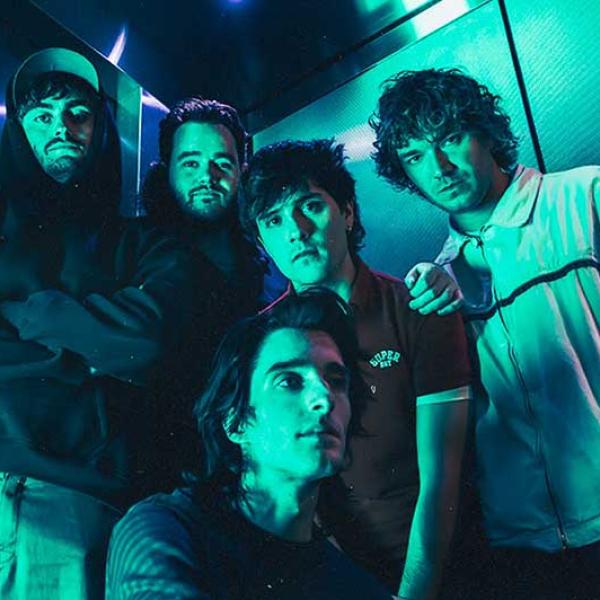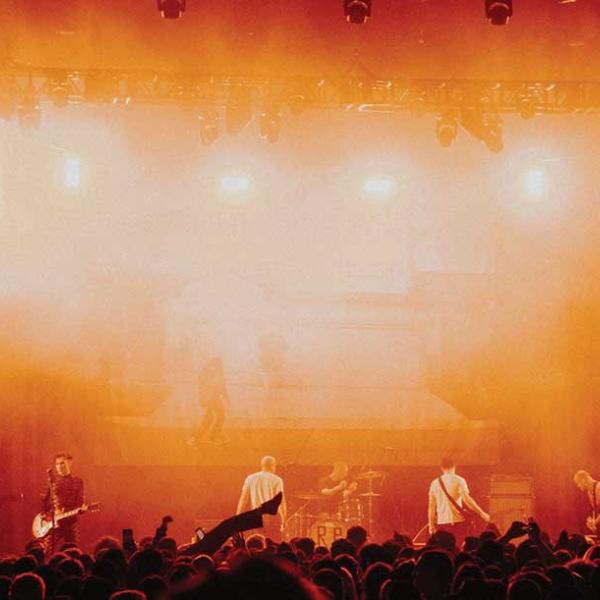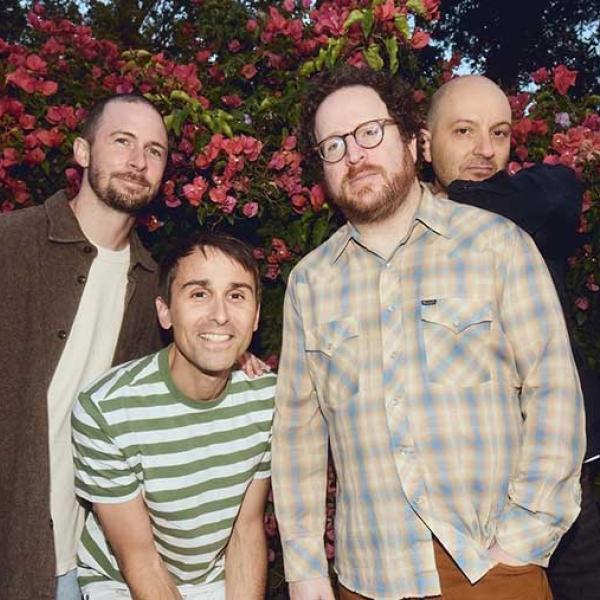Features
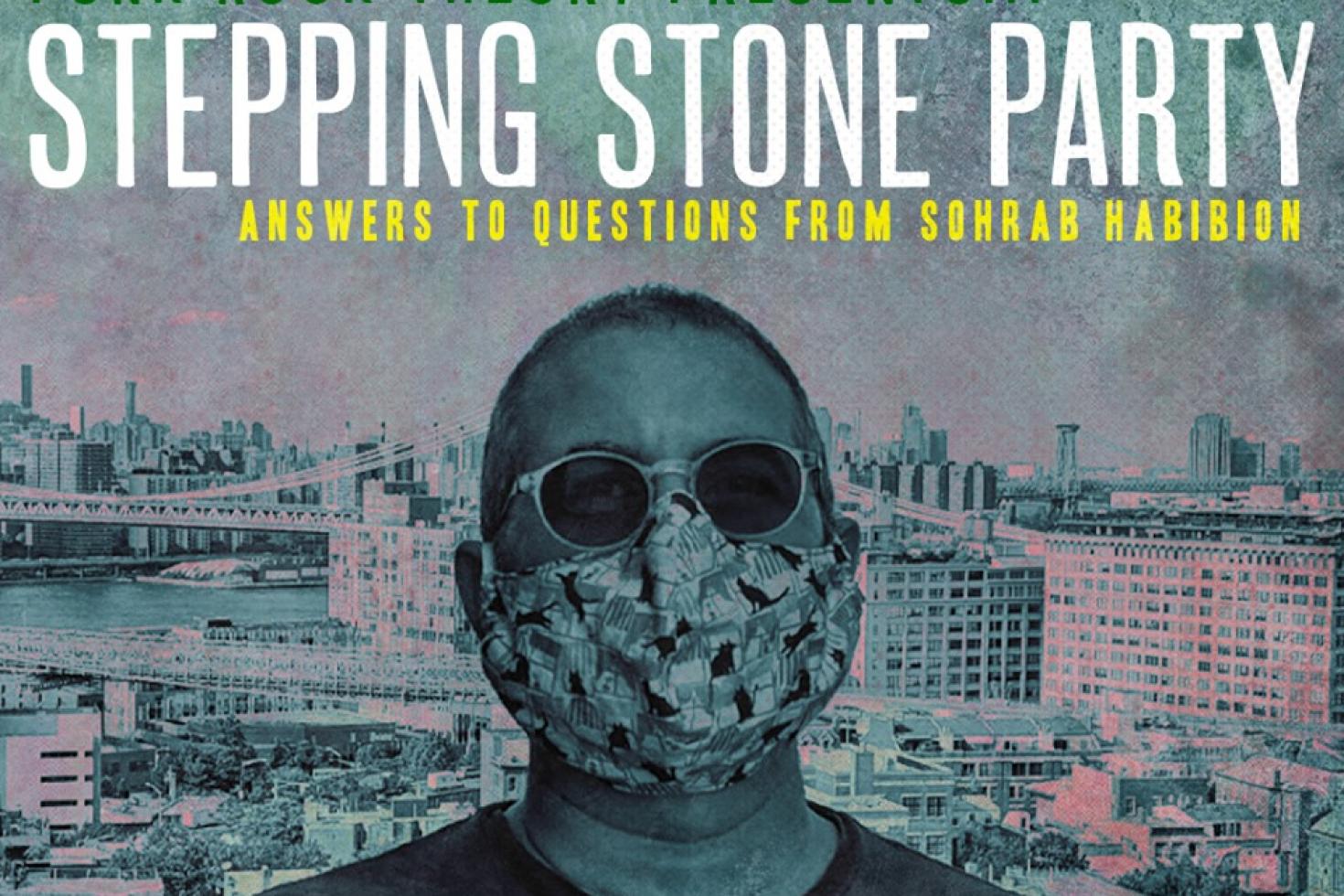
I don’t recall when I first met Mark, but at some point he seemed to be everywhere I turned my head. And Mr. Cisneros was equally impressive with a guitar in his hands as he was behind a drum kit or with a saxophone dangling from his neck. So much so that it was no surprise to discover how in-demand he was in all corners of the underground expanse we here at Stepping Stone Party HQ tend to slink around in. And still, when Mark has not been on tour with one band or another, he’s totally game for jumping on stage to join my group, SAVAK, for a few songs whenever we cruise through DC. What a mensch!
While the 5,000+ members of the Dischord Records Fan Page patiently hold our collective breath til early next year for the Hammered Hulls album to arrive, Mark’s playing can be found on two new recordings for garage rock aesthetes In the Red Records in the next couple of months: a Kid Congo and the Pink Monkey Birds 4-song 12” EP and a Des Demonas 7-song 12” EP. He also added guitar on a couple of Ziemba tracks that Sister Polygon is releasing next month. Lastly, rumors are there might even be a something from Deathfix this year, so fingers crossed for that.
But let’s get down to the Q&A. Mark references A LOT of wonderful musicians in his answers and I highly encourage you to click on the links and listen along.
SH: Knowing that you’ve played bass in Deathfix, guitar in The Pink Monkey Birds, Des Demonas and Hammered Hulls, drums in Chain & the Gang and The Make-Up, keyboards in Edie Sedgwick, and saxophone with Death Valley Girls, do you feel any instrument is your primary one?
MC: I think just based on the amount of time I’ve been playing them I’d have to say guitar and drums are the primary.
SH: Is there one you go to most when you are writing?
MC: Writing is more tricky since it depends on which project I’m writing for. I try to keep everything compartmentalized as much as I can, although one always ends up melding with another. For example, I can be working out something on guitar but my drummer mind will inevitably get involved and that can change what the guitar is going to do, and visa-versa. If I’m writing Low Ways (Quartet) stuff then that’s done on saxophone or piano. In general it really just comes down to that feeling that hits you and makes you want to pick up a specific instrument.
SH: In what order did you learn the various instruments you play?
MC: My first love was bass guitar. When I was 13 I asked my parents if they could buy me a bass, I practically begged them. My little circle of friends who wanted to start playing music had got guitars pretty quickly and somebody had to get a bass. I had my heart set on playing bass but it turned out my dad worked with a guy who had played guitar and he advised my dad against getting me a bass. He said something to the effect of, “Get him a guitar. If he can play guitar, he can play bass.” I was so bummed, and actually had the nerve to say I didn’t want some lame heavy metal looking guitar but something cool like Chuck Berry’s guitar. Ridiculous. I’d be lucky to get anything.
I got a guitar that year for Christmas, a Washburn copy/knockoff of the Chuck Berry-style Gibson ES-335, and of course I was so super psyched. Still have it. Then of course after finally getting a guitar, I started becoming the default drummer, if there were drums around. I took to them pretty quickly and nobody else seemed that interested in putting down their guitars. Then the rest came gradually, but saxophone didn’t happen until I was well into my 20s, when my mind started opening up to Jazz.
SH: Does any particular instrument inform another in a strong way? For example, are you a better guitar player because you can also play the drums? Or does playing the guitar make you a more sympathetic drummer?
MC: I think so? Probably. It’s not a conscious thing but, like I was saying, my drummer mind will almost always intervene if I’m on guitar, and my guitar mind will do the same if I’m on drums. If anything it makes me a more sympathetic guitar player, because, as the universe knows, there’s not enough of those kinds of guitarists around. Ha! The rhythmic interaction, the interplay... that’s what gets me and that’s what has to happen. I also very much identify as a bass player too and I really think that informs a lot of my playing.
SH: Does your feeling about cymbals change depending on whether you are behind or in front of the drum kit?
MC: Hmmm, not really. I pretty much always feel the same way, and that is: a lot of drummers should really put more effort into playing better cymbals. Seriously. It took me YEARS to figure out that I didn’t need the thickest, heaviest, loudest steroid-rock cymbals out there. And it wasn’t even that I needed them, it’s just that they were the only kinds of cymbals that were readily available. From about 1968 to 1995 there was a full-on arms race between guitar/bass amp manufacturers and drum & cymbal manufacturers. Drum sizes got bigger and cymbals got thicker and heavier in order to keep up with the crazy volume levels of giant stacks of amps on stage. Guitarists go through a zillion guitars, pedals, and amps, but too many drummers just stay with the cymbals they essentially started with.
Of course there’s a lot of heavy-duty rock and metal drummers who require those kinds of heavy cymbals for their extreme playing conditions, but to see/hear/play with drummers that have a hard time being their own “mixer” just bashing away on a cymbal that’s literally the loudest thing in the room? That is a bummer. For your ears, their ears, their bandmates’ ears, and especially to an engineer in a recording situation. Playing with Chris Wilson in Hammered Hulls, for example, is such a joy because, other than being a super amazing, awesome person and musician, he’s a real powerhouse drummer who uses what most would classify as Jazz cymbals. Thin, warm, dark, very musical and not abrasive. He gets it. He’s got such a great approach. He absolutely brings the power, but he could also play the most simple, sparse drum part and all you’d be thinking about is that beautiful sound.
SH: You’re originally from the Los Angeles area, right? What was your introduction to the DC punk scene?
MC: When I was first getting into Punk, the main method of hearing the music was mostly from dubbing cassettes from friends and my older sister. A lot of the time they’d be mixtapes, only partial albums, etc. I heard the Bad Brains but I didn’t know they were from DC until after I became familiar with Minor Threat. And I think the reason I knew Minor Threat was from DC is because some older punks told me/us about Straight Edge. Which blew our teenage minds because we thought, “Wait, they were ‘straight edge’ on purpose??” But from Minor Threat I learned about Dischord, and that opened the door.
The more I matured, the more I appreciated the thoughtfulness and artfulness of the DC scene. Dischord and SST (in LA) were pretty similar to me in that way. With every little speck of enlightenment I received as a growing young person, the more of their evolving/evolved catalogs I was able to get into and appreciate.
SH: Given all the people you’ve had a chance to play with, who have you been most surprised and amazed by as a musician that's not Brendan Canty?
MC: Ha! Well, Brendan is actually one of the most amazing, gifted, and hard working musicians I’ve ever met, that’s for sure. And an equally incredible person. Man, I’ve been so damn fortunate to have had the opportunity to play with so many of my favorite musicians and genuine heroes. Wayne Kramer of course absolutely blew my mind. Playing bass with him and doing MC5 songs was a dream come true, although I never dared dream something like that! Playing those songs and feeling that sound from his amp, I could have easily cried a little during that first soundcheck.
Kid Congo Powers was/is the same experience. Total hero. Chicano hero. Was just trying to keep my cool when first playing Cramps and Gun Club songs with him and that beautiful guitar sound. Equally inspiring is how he runs a band. No manager, never had one. Not at all concerned with “industry” mandates. Streamlined and as stress-free as possible. Just creating, putting in the work, and not stressing over the things so many people think you have to do in order to advance your career. The idea of not trying to hate the thing you love really resonates.
I got to record some bass for Jody Watley on a track a little while back, and even though I didn’t get to meet her, the “scratch” vocal and her backing vocals were crazy good. Like, CRAZY good. There was no studio trickery there, her voice was was just that incredible. Next level pop star stuff. That was eye-opening.
Playing with Ian and Amy, in what was to become Coriky, was also an amazing experience. I played bass and practiced with them 2 to 3 times a week for almost a year leading up to Joe moving back to DC from Italy. Working out their song ideas and jamming out parts. Lots of cool improv stuff, too. What surprised me most was the depth of Ian’s musicality. His musical tastes are so very wide-ranging and he can pull that stuff into his playing at any given moment. And he’s got riffs, riffs, riffs! He’d be like, “Hey check this out, I was messing around with it this morning.”, and it’d be so super killer! A few of those are on the Coriky record. Great record. And Amy is one of my favorite drummers, EVER. I saw the Warmers in the 90s and after seeing her play I had to go home and totally reevaluate my drumming. She already had, even at that time, a completely original and fully-formed style and voice on the instrument.
I could go on and on. Genuine geniuses like Shannon Shaw, Mary Timony, Kim Salmon, Ian Svenonius, Mike Watt, Doug Birdzell, Luke Stewart, Rich Morel, Jacky Cougar Abok, Alec MacKaye, Chad Clark, and Devin Ocampo... and many more who surprise and amaze me. I’ve been so very, very lucky.
SH: I know you’re a big jazz fan. I feel like that world has struggled with its identity in trying to find a place between tradition and innovation. At what point does free jazz become as idiomatic as ragtime or swing or bop?
MC: That’s a really good question. Steve Lacy was interviewed by Derek Bailey for a book Bailey later put together of conversations with, and essays by musicians on the subject of improvisation. Lacy gives this brilliant account of his experience within the music from playing traditional New Orleans style to the avant-garde, and how, as early as the 1950s, “jazz” got to the point where it was no longer a music of improvisation. Like, the music’s lifeblood, improvised solos, were becoming so worked out and practiced ahead of time by musicians who committed to memory countless chord changes and corresponding patterns, phrases, licks, tricks, and schticks. Lacy said “They weren’t patterns when Art Tatum made them up!” He lost the stomach for it and, following Cecil Taylor’s lead along with a small group of those early free jazz cats, threw away the patterns, the gymnastics, the clichéd systematic way of playing and said “Fuck it.”
Now I’m a huge fan of a lot of styles within the music, very much so Free Jazz and the avant-garde or Improv or whatever you want to call it, and I know that Free Jazz isn’t immune to a clichéd systematic way of playing in its 60+ years. BUT, there have been, and continue to be, musicians who have such original and creative voices, they can come up with beautiful pieces of new music on the spot from nothing. Don Cherry called this Spontaneous Composition. With this approach there are no boundaries. I think Free Jazz is just another category name that will get left behind. The music has already evolved past it I think.
SH: Similarly, a band like The Make-Up or Hammered Hulls traffics in familiar rock’n’roll tropes, though they both manage to step forward with singular voices. Is that something that is discussed? Or do you just do what you like to do and not worry about it?
MC: Well it’s definitely not something that’s discussed. Both groups just do what feels good to us. We like what we like and I hope that’s enough to keep what we do interesting. Putting a lot of faith into our built-in quality filters. I think maybe one of the most important starting points might be to not consciously try to create something that no one‘s ever heard before. It seems like folks sometimes get stuck chasing their own tails that way.
SH: You and your wife both DJ regularly, so what’s a proper Sunday morning breakfast soundtrack at your place?
MC: I do DJ sometimes but Alyssa, aka Baby Alcatraz, is the real-deal DJ. She’s really one of the best 50s/60s 45 DJs around. She’s got all kinds of great stuff and is always playing something cool at home. But I’ll tell you, lately we’ve actually been listening to the radio a lot. A DC station called Majic 102.3. A mix of 70s/80s disco and funk, more modern R&B hits, and Go-Go. Keeping our spirits up.
10. When you think of Latin Roots, does your mind first go to Fugazi or Chico O'Farrill?
MC: Hahahaha! Nice one. Well, obviously when I think of Latin roots my own Latino/Chicano heritage is ever-present. Respect to the great Chico O’Farrill, but I do love that Fugazi song and I’ve often wondered what Guy’s lyrics meant. Maybe different meanings? One day I’m gonna ask him. Also, have you ever sang “It’s time to meet Jamaicans” along with the ending??
*Sorry, Guy! All love & respect!*
SH: Coltrane, Miles and Monk are titans in their field and there are obvious punk equivalents, but who is your Ray Draper or Shirley Scott or Abbey Lincoln?
MC: This one is hard because I think they’re all titans! The musicians in the punk world who I would name are definitely titans in our circles, if not exactly regular household names, although depends on the household! Like Asa Osborne, Michael Hampton, Eddie Janney, David Grubbs, Devin Ocampo, Eve Libertine, Mick Collins, Rachel Aggs, James Canty, Charlie Quintana, Katherina Bornefeld, Joe Baiza, Pat Place, Tomata Du Plenty, Alice Bag, Sara Lund, Ash Bowie, John Reis, Christina Billotte, Michelle Mae, brothers John and Rob Wright, Larissa Strickland, Phil Free & Andy Palmer... Ha! I’m just naming amazing people who may or may not be as famous as some other amazing people. Sorry!
SH: As someone who tours as much as you have, you get to see musicians all over the world. Despite the familiarity and repetition, some moments must rise above. What’s the first musician you can think of who most recently made you pay closer attention despite being tired and possibly hungover?
MC: There’s been a run of some special tours recently, before the pandemic, that I’ve been very, very fortunate to be a part of. Having my mind blown every night by Neko Case and her amazing band, The Scientists, Hot Snakes with both super drummers Jason AND Mario taking turns, Slim Cessna’s Auto Club, Clear Channel... a bunch. But in recent years the one person who really stopped me in my tracks was the late great Charlie Megira. His group opened for Kid Congo and the Pink Monkey Birds on a run of shows and he really had my number. Some of the most beautiful music to ever be.
SH: Last but not least, what’s your favorite record on Lovitt?
MC: Puff Pieces! ...I don’t know if the Monorchid’s “Let Them Eat” actually counts?


